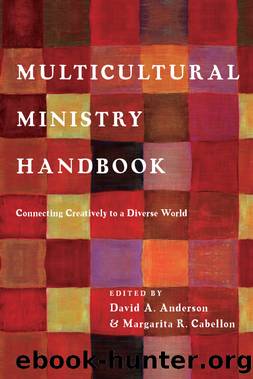Multicultural Ministry Handbook by Anderson David A.;Cabellon Margarita R.;

Author:Anderson, David A.;Cabellon, Margarita R.;
Language: eng
Format: epub
Publisher: InterVarsity Press
Published: 2010-07-02T00:00:00+00:00
What is heard. What people see when they walk through the doors of your church is critical. However, what is heard is just as important. This is one of the most difficult tasks for the multicultural church. People are particular about their music. I have heard many stories about churches that have split over styles of music: the music is too loud or too soft; itâs too funky or too chilled out; not enough or too many hymns are sung; too many new songs or too much contemporary music is played. It never ends.
Today, it seems some churches are resigned to have two or three âseparate but equalâ worship services. This way people can pick a traditional or contemporary worship service. Can you imagine people having worship wars in Jesusâ time?
Though this is sad, itâs an important issue we must address in a multicultural setting. In order for a multicultural worship ministry to have an impact, we must consider how people experience worship through music. People of different cultures often experience or respond to music in different ways. Some people assume that people of color respond to an R&B or Gospel sound while others respond more to acoustic or rock music. I have found that it goes all across the board and many times it is hard to predict. So, we try to incorporate all we can into our multicultural worship setting. Why not try to hit as many cultures as you can or even try to develop something newâsomething that we call a âthird culture sound.â
Key 1: Find your own worship sound (a third culture sound). If we are not careful, we can be seduced by what we hear on the radio and what the CCM Billboard says great worship music is. We long to re-create the latest Chris Tomlin or Tye Tribbett song. If only our worship team could do that song like David Crowder or Byron Cage. Our philosophy at Bridgeway has been to use those things only as a guide to our worship. Sure, we do a lot of familiar songs that are heard on the radio, but once we get together to rehearse, we play and sing the song as we do it, not the person on the recording.
We may do a song two weeks in a row. However, the song may sound a little different both weeks. Why? Because each week we rotate band members and singers. Those playing that week determine how the song sounds. And as the leader, Iâm completely okay with that. I cannot tell you how many times I have told my band to play it the way they would play it, and my singers to sing it the way they would sing it. This creates freedom that allows the musicians to creatively explore the gifts God gave them. A multicultural congregation needs to develop its own sound, because what we hear on the radio is often created with a unicultural audience in mind. Letâs create something new!
One of the
Download
This site does not store any files on its server. We only index and link to content provided by other sites. Please contact the content providers to delete copyright contents if any and email us, we'll remove relevant links or contents immediately.
| Church Administration | Church Growth |
| Church History | Church Institutions & Organizations |
| Church Leadership | Church Materials |
| Clergy | Ecclesiology |
| Ministry to the Sick & Bereaved | Pastoral Resources |
Fangirl by Rainbow Rowell(7874)
How to Bang a Billionaire by Alexis Hall(7442)
Wonder by R. J. Palacio(7102)
The Space Between by Michelle L. Teichman(6118)
The Thirst by Nesbo Jo(5822)
Assassin’s Fate by Robin Hobb(5275)
Wiseguy by Nicholas Pileggi(4633)
The Kite Runner by Khaled Hosseini(4511)
The Night Circus by Erin Morgenstern(4459)
Bittersweet (True North #1) by Sarina Bowen(4353)
Paper Towns by Green John(4193)
Gerald's Game by Stephen King(3949)
Too Much and Not the Mood by Durga Chew-Bose(3711)
Pillow Thoughts by Courtney Peppernell(3454)
Twelve Days of Christmas by Debbie Macomber(3043)
Goodbye Paradise(3007)
Good by S. Walden(2932)
The Rosie Effect by Graeme Simsion(2734)
After We Fell by Anna Todd(2669)
